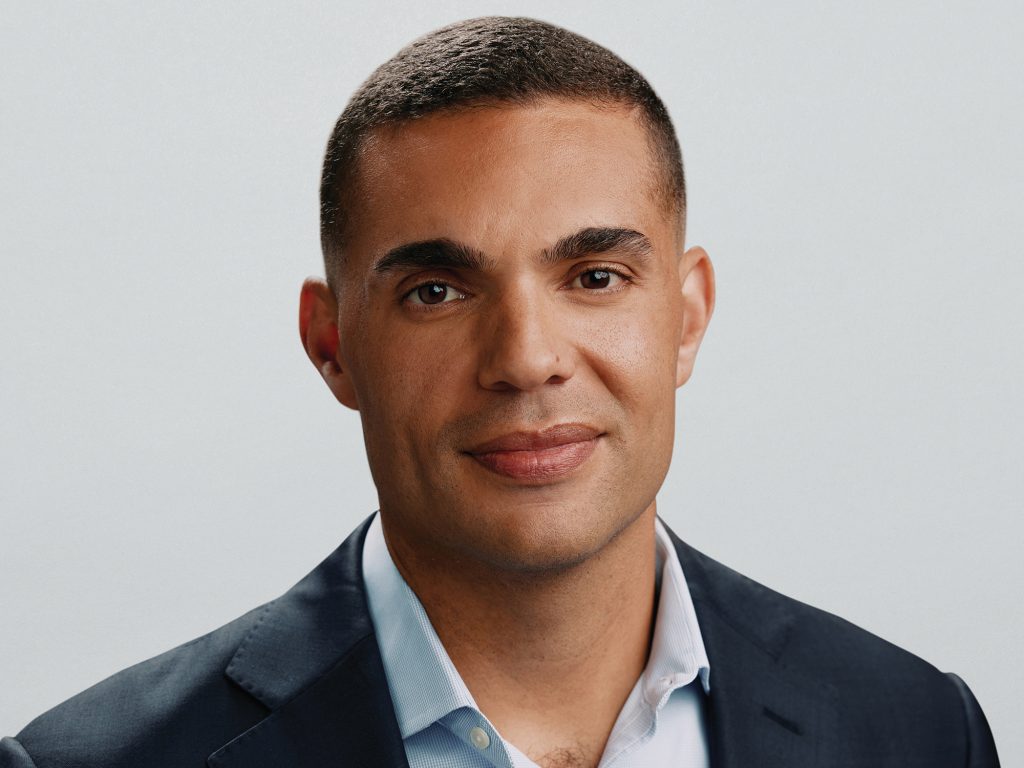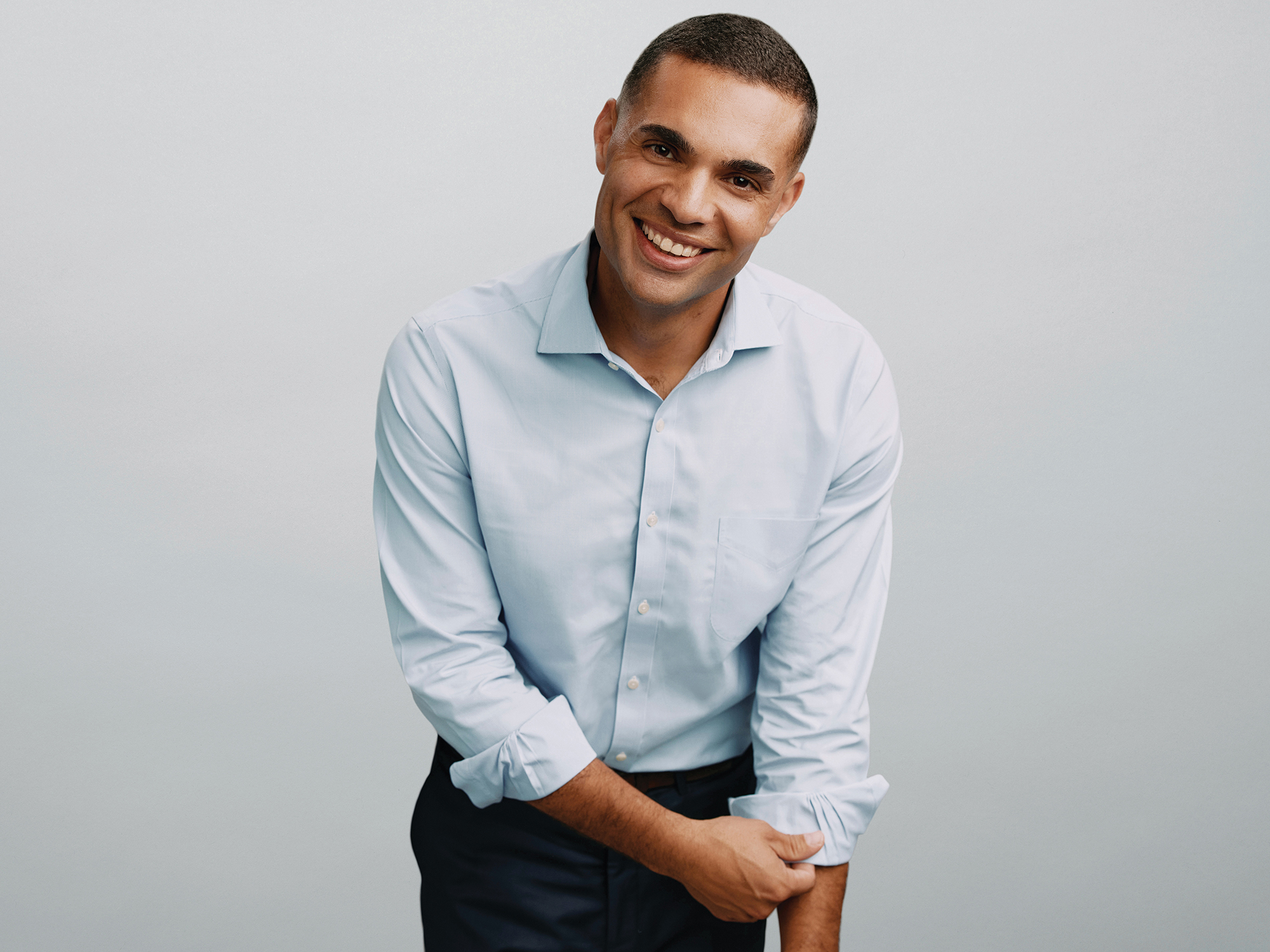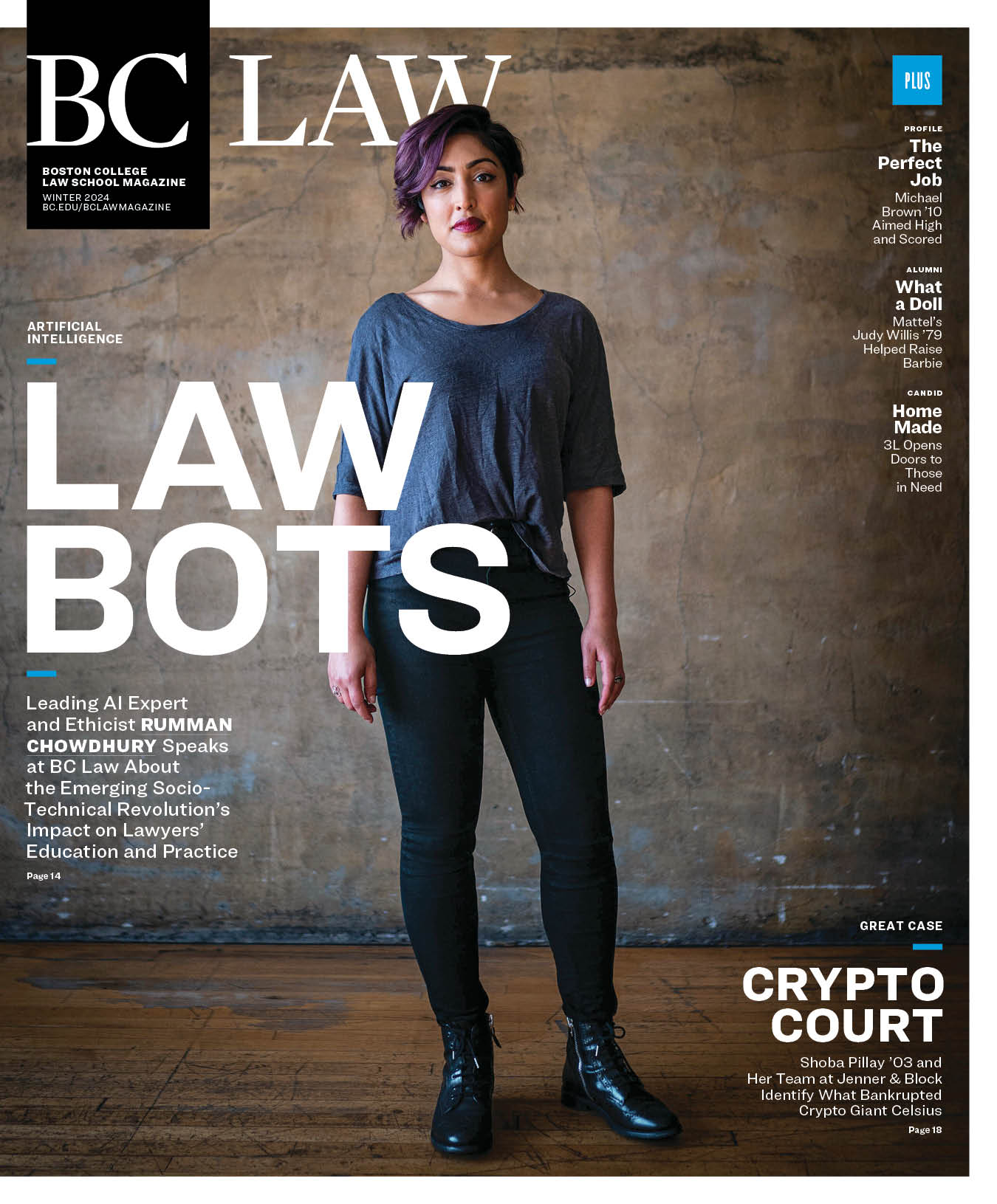When Michael Brown ’10 was an undergrad at Williams College, he occasionally spent weekends at his friend Jon Poppe’s house in Upper Saddle River, New Jersey. “One time I had a party there,” recalls Poppe, who was recently named Columbia University’s head football coach. “Mike didn’t know as many people as usual, so I figured he might be a little out of his comfort zone. But when I went to check on him, there was a whole crowd around him and he’s laughing and sharing stories. People just gravitate toward him.”
That trait is mentioned again and again by Brown’s friends and colleagues, and it’s part of what makes him a “natural leader,” according to Diane Brayton, executive vice president and general counsel of The New York Times Company, where Brown was recently promoted from assistant secretary to corporate secretary after just nine months on the job.
“When you start at a new workplace,” Brayton says, “it usually takes a while to climb the learning curve, but Mike very quickly established himself as highly collegial and a trusted expert for our key stakeholders. His people skills really helped him hit the ground running.”
The newspaper initially approached Brown in the summer of 2020, through a headhunter, but he declined the offer because it came during the uncertain early months of the pandemic. “The world was in lockdown,” he says, “and I didn’t know when I’d meet my new colleagues in person. I didn’t think that would be a great way to start a job.” The encounter put him on Brayton’s radar, though. “He impressed everyone during that process,” she says, “so when we had an opening in another role I thought would be a good fit for him, we tried again.”
By then, two years later, COVID-19 was under control, so when he was offered the job of vice president, assistant general counsel, and assistant corporate secretary, “it was the right time for me,” Brown recalls. “And it was a unique opportunity to help manage a very high-profile public company whose mission, to seek the truth and help people understand the world, I truly believe in.”
“When you start at a new workplace, it usually takes a while to climb the learning curve, but Mike very quickly established himself as highly collegial and a trusted expert for our key stakeholders. His people skills really helped him hit the ground running.”
Diane Brayton, executive vice president and general counsel of The New York Times Company
Brown says that impulse, to “do purposeful work that could benefit society,” has informed each stop—at a white-shoe Boston-based law firm, two public energy companies, and a Bitcoin mining and infrastructure business—on the peripatetic journey that led him to The Times.
As an “uncertain nineteen-year-old kid” besotted by sports and wondering what to do with his life, Brown found his “most impactful college classes were around social inequity and injustices.” When a lawyer from a big New York firm who was serving as a fellow with the NAACP Legal Defense Fund came to talk at Williams, Brown had what he calls a eureka moment. “I realized I could have a nice career financially while also believing in the work I was doing.”
Once at BC Law, it didn’t take long for him to find his niche in business law and corporate governance. And he had a natural aptitude for them, said Professor Paul Tremblay, who oversaw the Community Enterprise Clinic that Brown participated in as a 3L. “One of Mike’s clients in the clinic resisted our guidance and was hard to work with,” Tremblay recalls, “but Mike was very diplomatic, and he found a way through kindness and compassion. In another situation he was dealing with this high-powered white-shoe lawyer peer-to-peer, even though she was uber-experienced and he was new to this. His calm demeanor and willingness to learn were impressive.”
Brown believes his ability to interact with anyone stems in part from his years at Milton Academy, a boarding school outside Boston he attended starting at age thirteen, returning home to Barnstable, Massachusetts, on weekends. “I was on my own for the first time in a dorm that had all these different cultures,” he says. “My first roommates were an artistic Black kid from Virginia and a white hockey player whose parents owned a gas station north of Boston. Another future roommate’s father was a diplomat based in Tunisia, and there were boys from Zimbabwe, South Korea, Texas, and New York City. It shaped my ability to work with and understand a wide variety of people.”
It probably didn’t hurt, social dexterity-wise, that he grew up mixed-race on predominantly white Cape Cod. His mother was a Portuguese health professional working with underserved populations when she met his dad, a hyper-intellectual Black doctor originally from Macon, Georgia, at Charleton Memorial Hospital in Fall River. After Mike was born, the couple had four girls in quick succession, all of whom are lawyers now. “His sisters are all super successful in their own right,” says Casey Cwynar, a childhood friend of Brown’s who also happened to be in his section at BC Law and now works at Gunderson Dettmer in Boston. “Probably partly because they had Mike as a role model.”

“Honestly, sports gave me everything. They taught me that everyone has a role to play and the smallest detail matters. And it adds a layer of humility and self-drive to your work to understand that getting recognized isn’t the most important thing, the team is.”
Michael Brown
The siblings got much of their love of learning and their work ethic from their mother and father, Brown says, but the oldest child’s “obsession” with sports started because of his grandmother. “My dad worked nonstop and my mom had four kids below me, so I spent a lot of time with my grandma in my childhood.”
She was an avid newspaper reader with an encyclopedic memory for anything Red Sox- or Celtics-related. “Until the day she died she didn’t understand football,” says Brown, who became a standout offensive lineman in college.
“The offensive line is an interesting breeding ground for personality,” says Sean Gleeson, another of Brown’s college roommates and teammates and now senior offensive analyst for the Northwestern University Wildcats. “It’s physically arduous but also requires a lot of attention to detail, like, ‘My foot needs to go here and my hand needs to go here.’ Mike was more concerned about that kind of stuff. Linemen just kind of stay on task and don’t get swayed by the noise.”
That kind of carefulness carried over to Brown’s academic work, too. “He had an analytical mind with a big-picture perspective,” says BC Law Professor Renee Jones, who stayed in touch with Brown after he graduated. “Even at a young age he was completely on top of client work,” she says. “Every time I brought up a new angle on something, he’d say, ‘Yes, I thought about that.’”
The lessons learned on the gridiron and in Little League have stuck with Brown. “Honestly, sports gave me everything,” he says. “They taught me that everyone has a role to play and the smallest detail matters. And it adds a layer of humility and self-drive to your work to understand that getting recognized isn’t the most important thing, the team is. That’s a vital part of the success of a play or a game—or a business.”
After his first year at BC Law, Brown received a diversity clerkship through the Boston Lawyers Group, and split that summer between Mintz Levin and State Street Bank and Trust. “It was amazing to see both the law-firm world and the in-house world in my first experience in the field,” he says. “It really gave me a perspective on potential career paths early on.” The following summer he returned to Mintz, which offered him a full-time job upon graduation.
“Unfortunately, it was not long after the ’08 collapse,” he says, “so my class ended up being deferred to 2012.” Though the delay was “nerve-wracking,” he became a staff attorney with the Clean Air Council in Philadelphia, working on natural gas fracking and other environmental issues—another passion of his, nurtured during childhood summers at Woods Hole day camp and honed in his two years serving as a member of BC Law’s Environmental Affairs Law Review.
He returned to Mintz when the deferral ended and says it would have been easy enough to stay. But he wanted a less traditional path. “I’m just not someone who would want to look at the same credit agreement for forty years straight,” he says. “I like the challenge of doing something new.”
When NRG Energy beckoned three years later, he made the leap. The job was “right in the zone of what I wanted to do,” he recalls. He managed equity and debt offerings, handled all aspects of SEC reporting, and led legal support on M&A transactions. In 2018, the Fortune 500 company spun off its renewables business, which was renamed Clearway Energy, and CEO Christopher Sotos asked Brown to join the newly formed company. “That was more attractive to me than staying with the legacy company,” Brown says, “because I’d get a larger role, as number-two in the legal group behind the GC. I got exposed to so many different challenges and learned to prioritize in ways many lawyers don’t have to.”
“He had an analytical mind with a big-picture perspective.”
BC Law Professor Renee Jones
“It’s rare to have someone who can cover as many bases as Mike did with such a small legal team,” says Sotos. “In addition to securities filings and capital issuances, he managed our move to Global Infrastructure Partners and also everything that was involved when one of our biggest customers went bankrupt. It was an inordinate amount of pressure, but he kept a cool head through it all, when there was so much that could have gone wrong.”
Another three years passed before a bitcoin-mining company came calling for help following its public listing. Brown made the lateral move because he saw the parallels to the public company renewable energy project work he had been experienced managing, but when The Times approached him less than a year later, “the opportunity was just too good to pass up,” he says. He concedes his career trajectory may look unusual from the outside, but says every move he made was well considered and “would be better for my career in the long term.”
So, what do a big public energy company, a nimble but complicated renewables firm, an emerging special-interest start-up, and one of the oldest institutions in America have in common? “They’re all fast-paced environments,” Brown says, “and they’re all places where I could learn something new and take on a leadership role. Experiencing a lot of different things in life makes you more well-rounded.” That broad experience has stood him in good stead at The Times, where he handles governance matters, securities law compliance and disclosure, and entity management and as corporate secretary acts as a liaison between the board of directors and teams from the company’s sports, advertising, product, tech, and investor relations departments. “The job allows me to immerse myself in so many aspects of the business that I could stay at this forever, to be honest,” he says. “Because when you’re really motivated and excited to do something, you don’t want to be anywhere else.”



